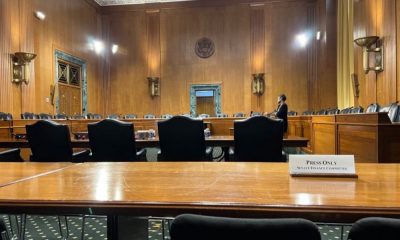Texas
Texas governor signs ‘Save Women’s Sports Act’
Transgender athletes barred from teams that correspond with their gender identity
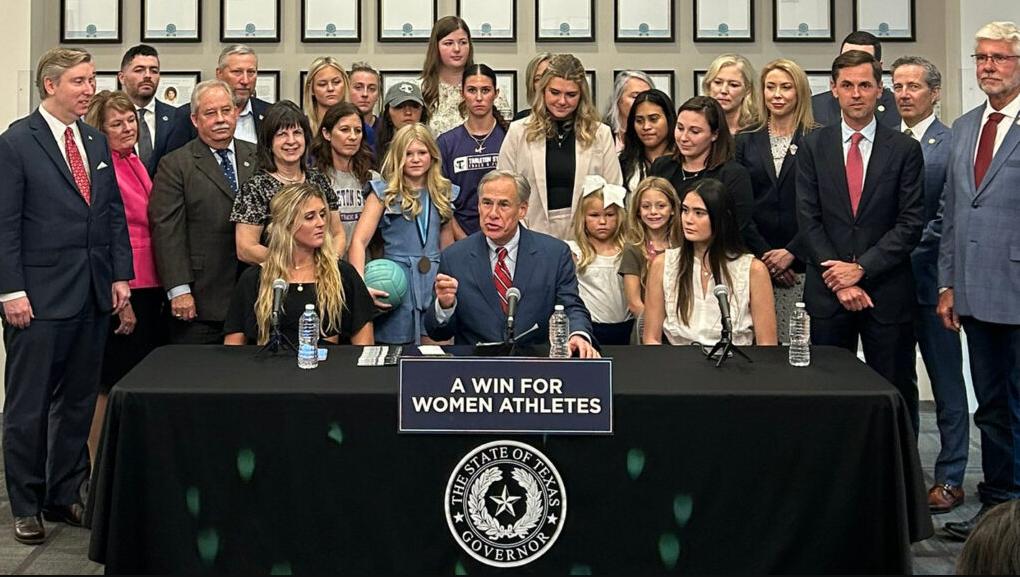
Republican Texas Gov. Greg Abbott on Monday signed Senate Bill 15, or the “Save Women’s Sports Act,” which bars transgender athletes from competing on sports teams that match their gender identity at Texas universities and colleges.
The law specifies that athletes compete on teams corresponding to the student’s biological sex listed on their birth certificates. Monday’s signing at the Blagg-Huey Library on the campus of Texas Woman’s University was purely ceremonial, as the governor had previously signed the measure two months ago.
“The legacy of women’s sports will be safeguarded for generations to come because of the law I am about to sign,” Abbott said. “Women in Texas can be assured that the integrity of their sports is protected in our great state.”
The Dallas Morning News reported that in addition to conservative lawmakers and other interested parties, Abbott was joined by former college athletes Riley Gaines and Paula Scanlan. Gaines, who attended the University of Kentucky, has built a media career stemming from her appearance at the NCAA Swimming and Diving Championships in March 2022. During the 200 freestyle event she tied with Lia Thomas, a trans student athlete from the University of Pennsylvania. Scanlan was on the swim team with Thomas.
“This is huge news, not only for Texans but for girls across the country,” said Gaines. “This new law will protect the integrity of women’s sports by prohibiting men from competing against women’s athletes at Texas colleges and university.
“It’s pretty amazing that this law is even necessary,” Gaines continued. “If you have eyes and a brain and any amount of common sense, you can easily comprehend the fact that men, on average — and this is a fact — are taller, stronger, more powerful, can jump higher than women. It’s biological reality.”
When asked by a reporter if he understood that in the eyes of the LGBTQ community the law made them feel marginalized and how would respond to that Abbott snapped back that women like Gaines and Scanlan — not LGBTQ people — were the true victims of marginalization.
“These are the women who committed their lives — altered their lives — so that they can compete, and yet you heard Riley talking about how she was marginalized,” Abbott said. “She was the winner, and she was denied that victory.”
The Dallas Morning News noted that critics charge that the law seeks to address an issue that largely doesn’t exist. Only about three dozen openly trans athletes have competed at the collegiate level across the country, and none have been known to compete at a Texas college or university.
Asked by the Dallas Morning News about that criticism during a news conference after the bill signing, Abbott laughed but did not answer.
Also present outside the library as the event was underway were about 200 protestors, many who spoke with the Dallas Morning News telling the paper they believed the Abbott’s priorities were out of step with the wishes of the majority of Texans.
Asked by the Dallas Morning News about that criticism during a news conference after the bill signing, Abbott laughed but did not answer.
Also present outside the library as the event was underway were about 200 protestors, many who spoke with the Dallas Morning News telling the paper they believed the Abbott’s priorities were out of step with the wishes of the majority of Texans.
HAPPENING NOW— protesters outside the Texas Woman’s University venue where Greg Abbott will ceremonially sign legislation involving NCAA women’s athletics. pic.twitter.com/NypJ7kuerz
— Dionne Anglin (@DAnglinFox4) August 7, 2023
Texas
Pornhub blocks Texas accessing site over age verification law
Court battle forced statute to take effect

Aylo (formerly MindGeek) the largest global adult online entertainment conglomerate, owned by Canadian private equity firm Ethical Capital Partners, has restricted access to its platforms including its flagship Pornhub in Texas after a court battle forces the state’s age verification law to take effect.
Texas Republican Attorney General Ken Paxton had appealed a U.S. District Court decision that enjoined him from enforcing House Bill 1181. Paxton and others argued that purveyors of obscene materials online needed to institute reasonable age-verification measures to safeguard children from pornography.
A week ago the 5th U.S. Circuit Court of Appeals partially vacated the original injunction, ruling that the age verification requirements are constitutional.
“Applying rational-basis review, the age-verification requirement is rationally related to the government’s legitimate interest in preventing minors’ access to pornography,” the three judge panel of the 5th Circuit explained. “Therefore, the age-verification requirement does not violate the First Amendment.”
While the court vacated the injunction against the age-verification requirement of the statute, it upheld the lower court’s injunction against a separate section of the law that would require pornography websites to display a health warning on their landing page and all advertisements.
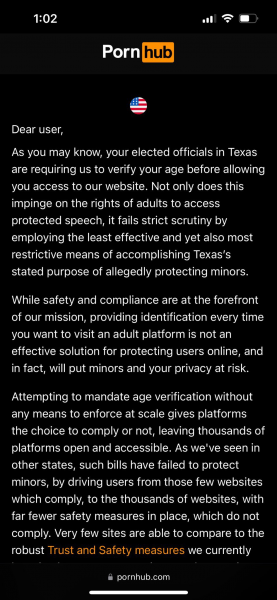
The Houston Chronicle reported people who go to the site are now greeted with a long message from the company railing against the legal change as “ineffective, haphazard, and dangerous.” The company calls for age verification by the makers of devices that let people on the internet, instead of individual websites.
Age verification legislation was enacted in several states in 2023 in addition to Texas, including North Carolina, Montana, Arkansas, Louisiana, Mississippi, Utah and Virginia.
The new laws require users to provide digital confirmation via a certified approved third party vendor like London-based digital identity company Yoti. The other possibility would be a state approved digital ID such as the California DMV’s Wallet app, which contains a mobile driver’s license.
Users accessing Pornhub from within Louisiana are presented with a different webpage that directs them to verify their age with the state’s digital ID system, known as LA Wallet. The law passed in 2022 subjects adult websites to damage lawsuits and state civil penalties as high as $5,000 a day if they fail to verify that users are at least 18 years old by requiring the use of digitized, state-issued driver’s licenses or other methods.
The Associated Press reported this past October that an adult entertainment group’s lawsuit against a Louisiana law requiring sexually explicit websites to verify the ages of their viewers was dismissed by U.S. District Judge Susie Morgan in New Orleans.
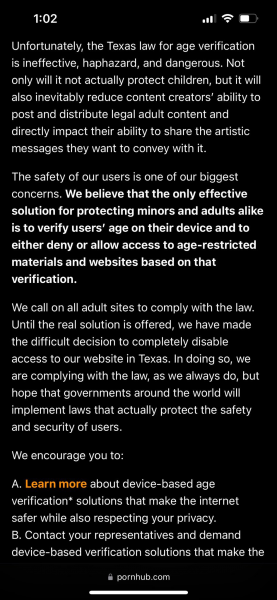
Potential or existing Pornhub users in North Carolina and Montana are directed to a video that features adult film star Cherie DeVille, who recites a message also written under the video.
“As you may know, your elected officials in your state are requiring us to verify your age before allowing you access to our website. While safety and compliance are at the forefront of our mission, giving your ID card every time you want to visit an adult platform is not the most effective solution for protecting our users and in fact, will put children and your privacy at risk.”
“Mandating age verification without proper enforcement gives platforms the opportunity to choose whether or not to comply,” the statement continues. “As we’ve seen in other states, this just drives traffic to sites with far fewer safety measures in place.”
“Until a real solution is offered, we have made the difficult decision to completely disable access to our website in [the aforementioned locales]” the message ends with.
The company previously blocked Utah on May 7, 2023. CNN reported at the time:
Affected users are shown a message expressing opposition to Senate Bill 287, the Utah law signed by Gov. Spencer Cox in March that creates liability for porn sites that make their content available to people below the age of 18.
“As you may know, your elected officials in Utah are requiring us to verify your age before allowing you access to our website,” the message said. “While safety and compliance are at the forefront of our mission, giving your ID card every time you want to visit an adult platform is not the most effective solution for protecting our users, and in fact, will put children and your privacy at risk.”
Courthouse News reported that after Virginia’s bill was passed in June, state Sen. L. Louise Lucas, a Democrat, criticized the state for not creating a system for age verification, and instead leaving it up to websites to manage the process, citing security risks.
“We passed a bill during this session to protect children from online porn. However the executive branch had an obligation to create a system for age verification,” Lucas said on X, formerly Twitter. “We will continue our work to keep pornography out of the hands of minors … but we will also work to ensure that this Governor’s error does not put the privacy of Virginians at further risk.”
Beyond the U.S. in the European Union, Pornhub and two more of the world’s biggest porn websites face new requirements in the European Union that include verifying the ages of users, under the EU’s Digital Services Act.
According to a December 20 report from the Associated Press, Pornhub, XVideos and Stripchat have now been classed as “very large online platforms” subject to more stringent controls under the Digital Services Act because they each have 45 million average monthly users, according to the European Commission, the EU’s executive branch.
They are the first porn sites to be targeted by the sweeping Digital Services Act, which imposes tough obligations to keep users safe from illegal content and dodgy products, the Associated Press reported last month.
In addition to the adult entertainment websites, any violations are punishable by fines of up to 6% of global revenue or even a ban on operating in the EU. Some 19 online platforms and search engines have already been identified for stricter scrutiny under the DSA, including TikTok, Amazon, Facebook, Instagram, Google and more.
Texas
Abbott tells UN to ‘pound sand’ amid criticism of anti-LGBTQ policies in Texas
Governor signed seven anti-LGBTQ laws last year

Texas Gov. Greg Abbott (R) on Sunday dismissed news coverage of a letter issued last month to the United Nations that expressed alarm over the “deteriorating human rights situation” for LGBTQ people in the Lone Star State.
Signed by Equality Texas, ACLU of Texas, GLAAD, the Human Rights Campaign, and the University of Texas at Austin School of Law Human Rights Clinic, the letter details how Texas legislators introduced 141 bills targeting the LGBTQ community, passing seven into law.
“The UN can go pound sand,” Abbott wrote in a post on X.
The UN can go pound sand. https://t.co/JpWguPHGHJ
— Greg Abbott (@GregAbbott_TX) February 25, 2024
In 2023, the governor signed a ban on gender affirming care for transgender youth, a ban on diversity, equity, and inclusion programs at public universities, a ban on transgender athletes competing in college sports, a law allowing schools to use religious chaplains for counseling services, a ban on “sexually oriented performances” on public property accessible to minors (which targets drag shows), a law allowing schools to restrict LGBTQ books, and a ban on nondiscrimination ordinances by local governments.
The groups argued in their letter that these policies constitute a “systemic discriminatory policy” in violation of international human rights laws, such as the International Covenant on Civil and Political Rights, a multilateral treaty whose tenets are enforced by the UN Human Rights Committee.
Texas
Houston police: Lakewood Church shooter was not transgender
Far-right extremists fueled unsubstantiated, false narratives

In the hours after Genesee Moreno, a 36-years-old Latina woman, entered the sanctuary of Joel Osteen’s mega Lakewood Church and opened fire with an assault rifle this past Sunday, there were multiple instances of confusion over her gender identity, in part fueled by unsubstantiated or false narratives from far-right extremists.
During a briefing with reporters yesterday, Houston Police Department homicide commander Christopher Hassig stated with absolute clarity that Moreno was not a transgender person.
“Our shooter is identified by a driver’s license as Genesee Moreno, 36-years-old, Hispanic female. There are some discrepancies. We do have reports she used multiple aliases, including Jeffrey Escalante. So she has utilized both male and female names but through all of our investigation to this point, talking with individuals, interviews, documents, Houston Police Department reports, she has identified this entire time as female,” Hassig told the media.

In initial coverage, KHOU and the Houston Chronicle reported Moreno, who had used the name Jeffery Escalante, had an extensive criminal history dating back to 2005 according to a Texas Department of Public Safety records search. Prior arrests include failure to stop and give information, assault of a public servant, assault causing bodily injury, forgery, possession of marijuana, theft, evading arrest and unlawful carrying weapon.
Media outlets including Fox News and even NBC News who later retracted a portion of their story mistakenly framed the context as “a person who previously identified as male” which led to the incorrect framing of Moreno’s gender identity.
Far-right extremist pundits and at least one anti-trans member of the U.S. House of Representatives took up the “shooter was trans” narrative.
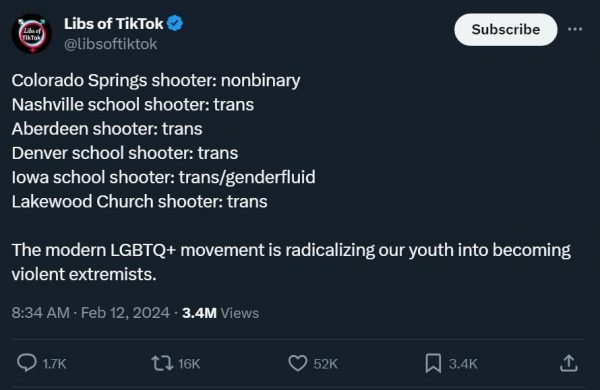
Chaya Raichik’s post had a companion extremist anti-trans X post by U. S. Rep. Marjorie Taylor Greene (R-Ga.), who republished a post by far-right media Blaze TV anchor Sara Gonzales, both falsely claiming Moreno was trans. Gonzales’ post appeared to contain a criminal record without attribution of its source.
Raichik also posted the same “criminal record” on her social media accounts.
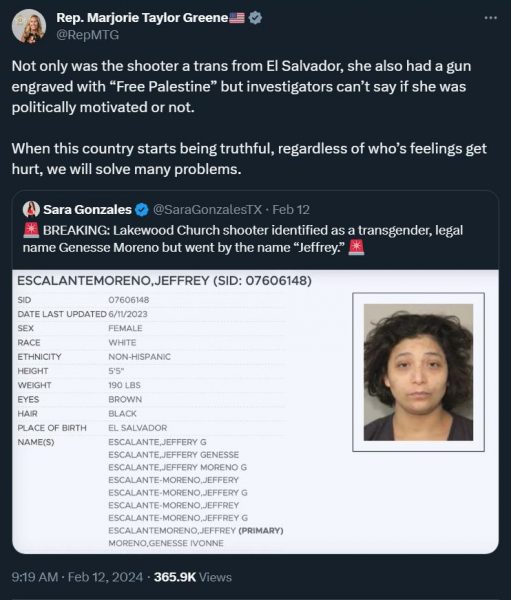
Fox News also ran misleading and false headlines regarding Moreno’s gender identity.
Alejandra Caraballo, a trans attorney and clinical instructor at the prestigious Harvard Law Cyberlaw Clinic who also writes on gender and technology issues for Wired and Slate magazines, debunked the Fox News allegations and called out the far-right anti-trans extremists.
“Far right extremist accounts like Libs of Tiktok rushed to call the shooter at Joel Osteen’s church a transgender woman. The police have just confirmed that is not the case and she was the biological mother of the child who was shot. They won’t apologize or retract their lies,” Caraballo said.
Oh no you don't Fox News, you don't get to make incendiary claims without evidence and then stealth edit your articles without a full retraction and correction. pic.twitter.com/o1bnJwVYi0
— Alejandra Caraballo (@Esqueer_) February 12, 2024
Ari Drennen, executive director of Media Matters of America’s LGBTQ Project, cautioned Tuesday the falsehoods and fabrications are “adding fuel to a moral panic” on trans issues as multiple state legislators rush to pass anti-trans laws:
A far-reaching media narrative has incorrectly identified the alleged armed assailant at a Texas megachurch as a transgender woman, adding fuel to a moral panic as legislators across the country push a raft of laws restricting the lives of trans people in the United States. 🧵 pic.twitter.com/OspQnHpGMp
— Ari Drennen (@AriDrennen) February 13, 2024



